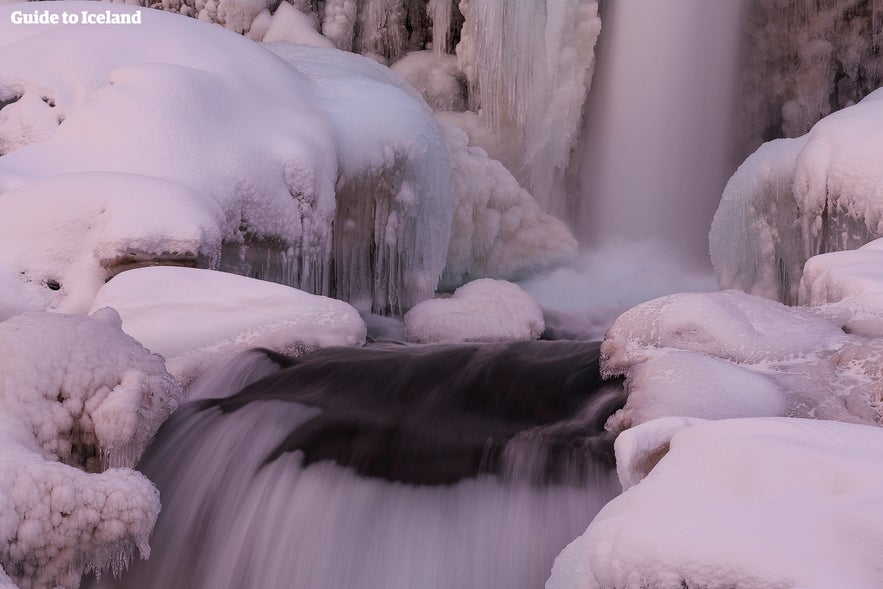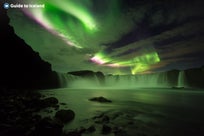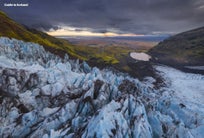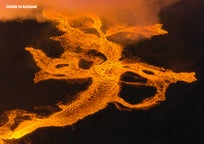
Beer Day in Iceland

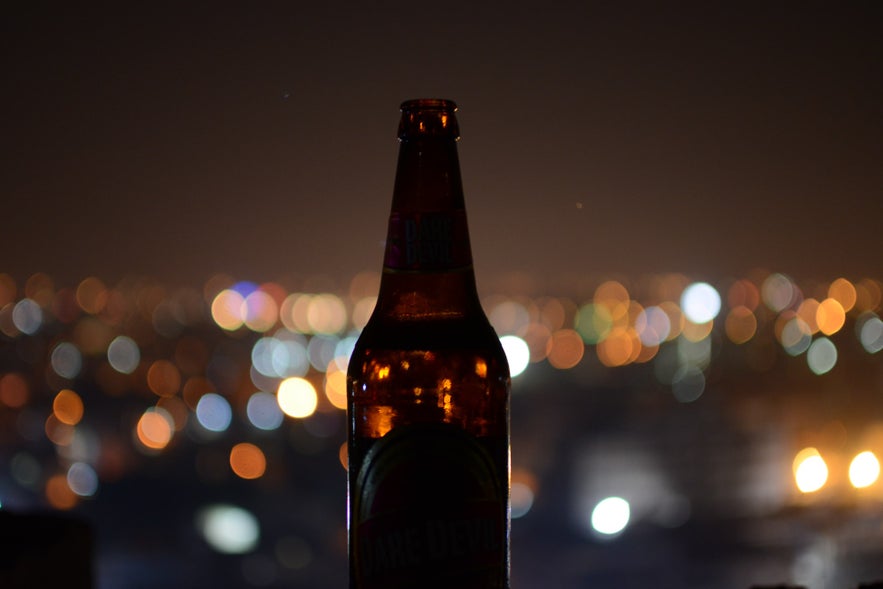
1st of March is the Icelandic Beer Day. Beer was banned in Iceland between 1915 and until 1989! But why? Learn all about Iceland's history with beer.
Photo above by Eeshan Garg. No edits made.
- Read about Reykjavík's Nightlife
- Read up on Happy Hour and discover The Cheapest Beers in Reykjavík
- Learn about The Best Restaurants in Reykjavik
- Join this brilliant and delicious Funky Reykjavik Food & Beer Walk
If you've ever been to Iceland chances are you've experienced some of Reykjavík's infamous nightlife. Icelanders are known for being rather quiet, that is until they've had a drink or five. Then suddenly they're all embracing and their loud, inner Vikings come to life.
Beer is the drink of choice for most Icelanders, so it might come as a surprise to some to hear that beer was actually illegal in Iceland, all the way up to the year 1989! So here a little light will be cast on what this ban was all about.
Alcohol Prohibition in Iceland
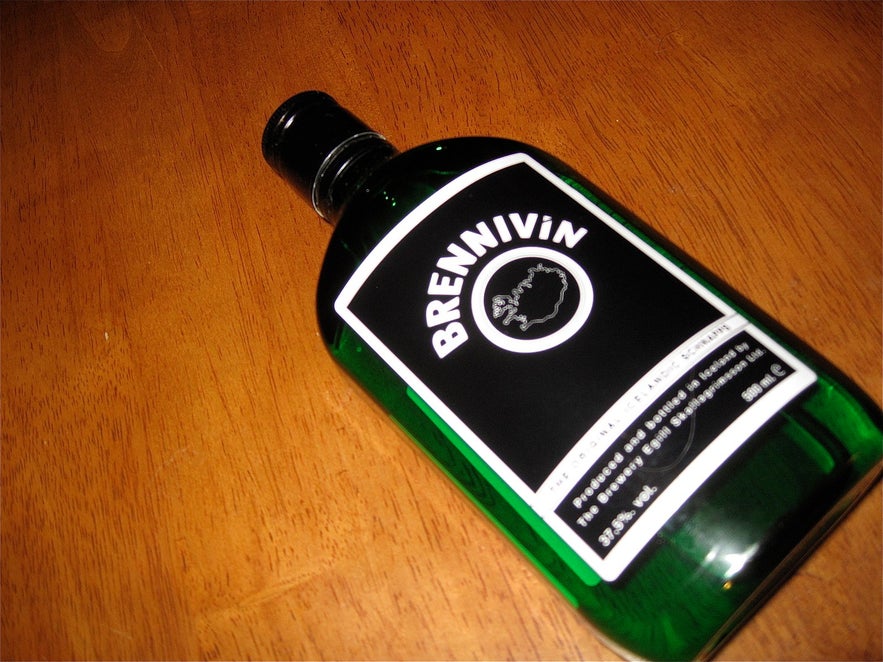 Photo from Wikimedia, Creative Commons, by cogdogblog. No edits made.
Photo from Wikimedia, Creative Commons, by cogdogblog. No edits made.
Prohibition went into effect in Iceland in 1915 and initially banned all alcohol - and was voted for by the Icelandic population. Shortly after, Spain threatened to stop importing salted cod from Iceland (Iceland's biggest export), unless Iceland imported Spanish wines.
The ban on red and rosé Spanish and Portuguese wines was lifted in 1921. Doctors also described strong alcohol for all sorts of illnesses, people brewed their own alcohol, and alcohol was smuggled into the country. But beer kept being left out.
From 1935 until 1989 the prohibition only applied to "strong" beer (more than 2,25%). That's mainly because authorities assumed that legalizing beer would cause "casual drinking" to increase, such as during the work week or during the day.
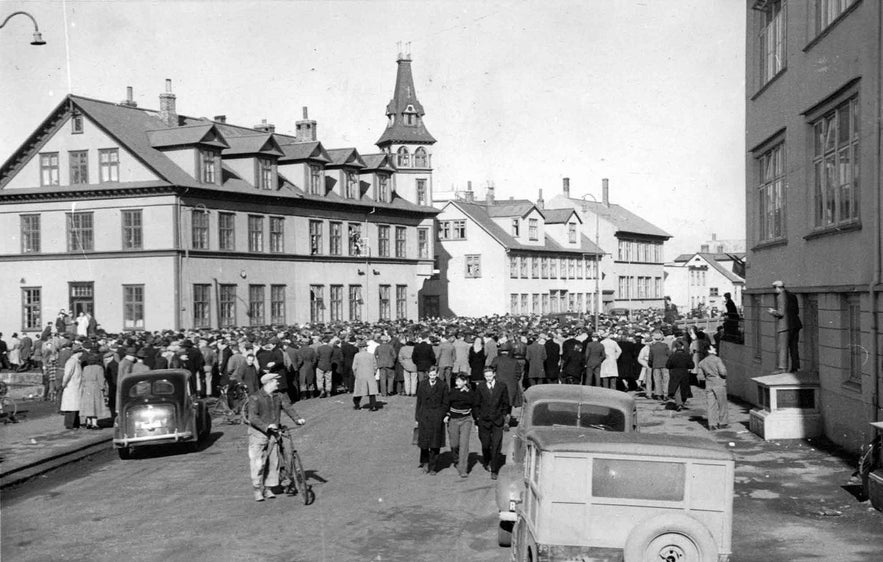 Photo from Wikimedia, Creative Commons, by Arnaldur Grétarsson & family. No edits made.
Photo from Wikimedia, Creative Commons, by Arnaldur Grétarsson & family. No edits made.
People still wanted to drink this golden liquid, and some people drank what is called 'bjórlíki' or 'Beer Likeness'. This normally consisted of a weak pilsner (with less than 2,25% alcohol in it), mixed with a bit of vodka, whiskey and some wine, bringing the alcohol level up to 5%. Not exactly the same taste as of beer, and people still craved the original.
'Bjórlíki' was sold in one of Reykjavík's first pubs, Gaukur á Stöng (Gaukurinn, which still exists) and was quite controversial, leading to also being banned in 1985.
When the beer ban was eventually lifted on the 1st of March in 1989 and people could legally buy beer, people flocked the streets to drink this previously unattainable drink.
The BBC wrote a long article about the Icelandic Beer Day, going into more specific details.
Where is Beer Sold Today in Iceland?
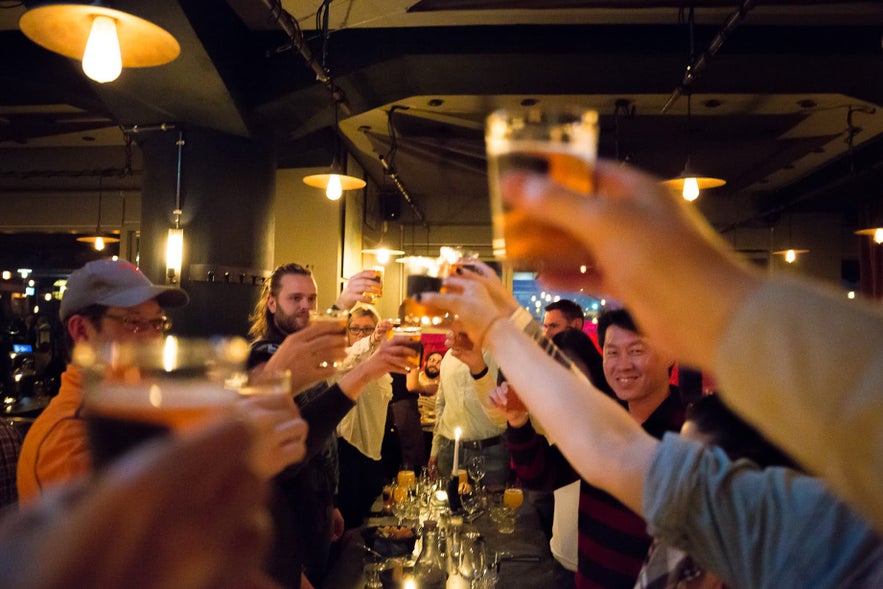 Photo from Locally Hosted Reykjavik Beer & Food Tour at the Old Harbor. No edits made.
Photo from Locally Hosted Reykjavik Beer & Food Tour at the Old Harbor. No edits made.
In Iceland you will need to head to a bar or to a liquor shop called 'Vínbúðin' that's run by ÁTVR (Áfengis- og tóbaksverslun ríkisins - The Governmental Alcohol and Tobacco Store), which is often also simply called 'Ríkið' or 'The Government' to buy beer.
You are not able to buy beer in supermarkets. If you think you found some cheap beer in the supermarket, then I hate to break it to you but that's not beer. That would be the aforementioned weak pilsner with less than 2,25% alcohol. If the plan is to feel tipsy, you might almost just as well be drinking water.
Regularly, the debate about whether beer and wine should be sold in supermarkets is brought up in parliament, but so far the ruling has always been against it.
Beer culture in Iceland has made a gigantic leap in the last few years, with a number of Icelandic brands and craft beer becoming available. Perhaps the most well-known Icelandic beer is Einstök, which is currently sold internationally in a number of countries.
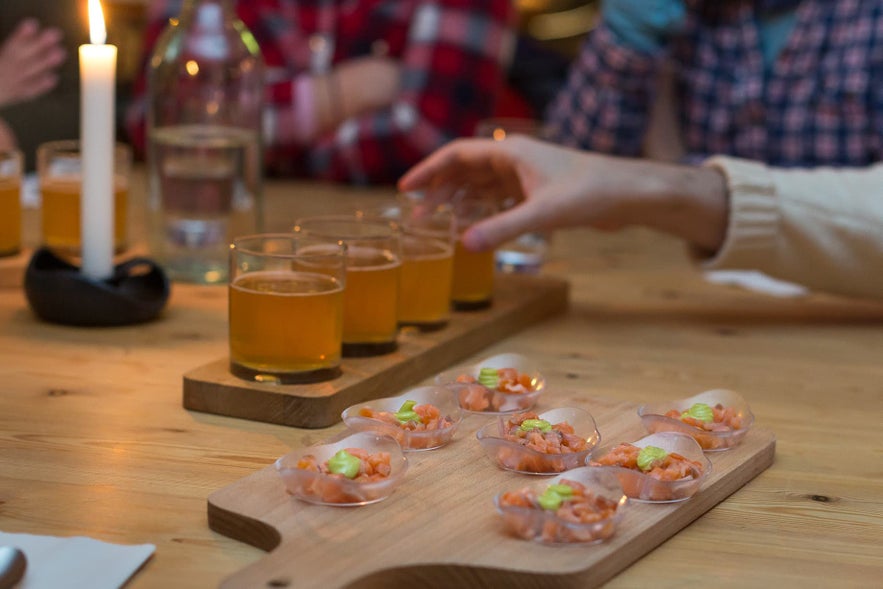 Photo from Locally Hosted Reykjavik Beer & Food Tour at the Old Harbor
Photo from Locally Hosted Reykjavik Beer & Food Tour at the Old Harbor
Other Icelandic beers you could check out are Kaldi, Bríó, Thule, Boli, Gull, Víking, special Christmas beers or summer beers and a variety of craft beers such as Úlfur, Bjartur or Surtur.
Pubs focusing on craft beers have also cropped up in downtown Reykjavík, and gone are the days of simply having 1 or 2 options of beer on tap in Icelandic bars.
Beer Day Celebrations
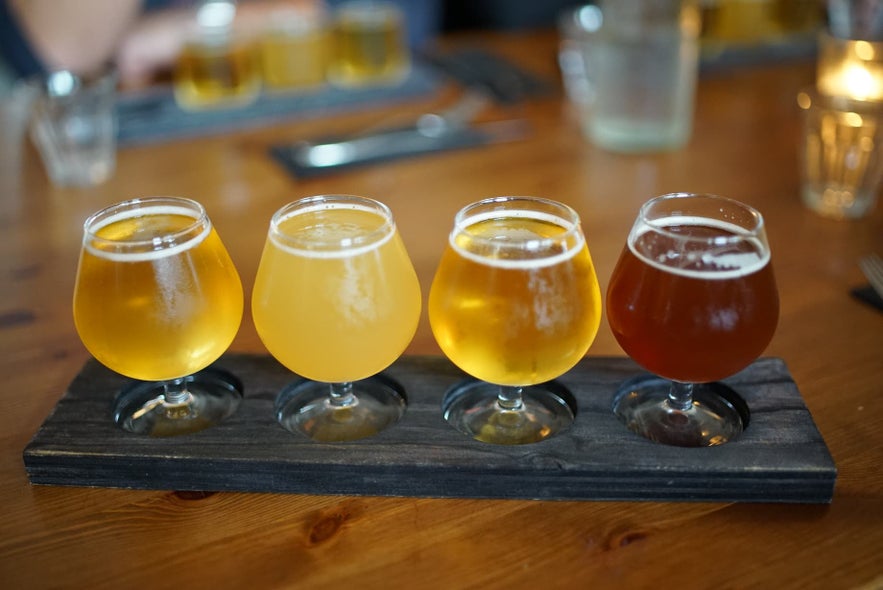 Photo from Guided 2.5 Hour Reykjavik Beer & Schnapps Walking Tour
Photo from Guided 2.5 Hour Reykjavik Beer & Schnapps Walking Tour
Nowadays, many people still celebrate the 1st of March as Beer Day, although there are no big organised events or parties. A yearly Beer Festival is held at Kex Hostel in February, but it doesn't overlap with Beer Day.
- Read about Festivals and Events in Iceland
On the 1st of March it's more likely that people just head to the nearest pub with a few friends for a glass or two (or ten). The team at Guide to Iceland is no exception, and we celebrate this day every year with a few drinks in the office.
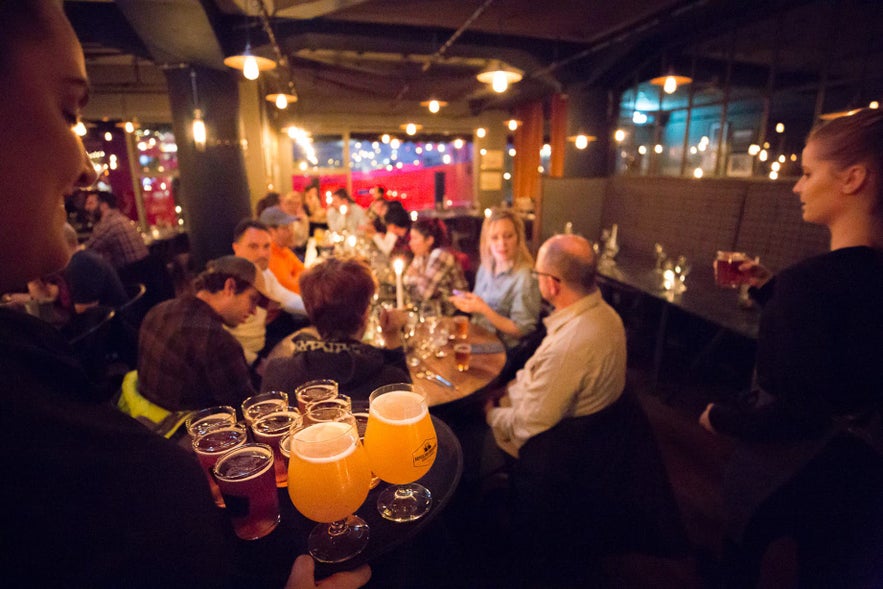 Photo from Locally Hosted Reykjavik Beer & Food Tour at the Old Harbor
Photo from Locally Hosted Reykjavik Beer & Food Tour at the Old Harbor
Often bars will have beer promotions on this day, with exceptionally low prices. If you enjoy drinking beer, we suggest you join the locals and head to the nearest bar. Skál!
Otros artículos interesantes
Nochevieja en Islandia
¿Cómo es la Nochevieja en Islandia? ¿Cómo es la Nochevieja en Reikiavik? ¿Qué hace que la Nochevieja en Islandia sea tan especial? ¿Dónde están las mejores fiestas de Nochevieja en Reikiavik? Entérate...Leer más
7 cosas del turismo en Islandia que los islandeses ODIAN
El crecimiento del turismo en Islandia tiene su parte buena... y su parte mala. ¿Qué es lo que más odian los islandeses del turismo en su país? ¿Qué distingue a un 'mal turista', y cómo puedes ser u...Leer másNavidad en Islandia | Guía Definitiva de Tradiciones, Comidas Navideñas y Más
Entérate de todo lo que pasa en Islandia en Navidad. ¿Cuáles son las principales tradiciones navideñas en Islandia? ¿Por qué Islandia tiene 13 Yule Lads? ¿Es lo mismo que Papá Noel? ¿Cómo se celebra...Leer más

Descarga la mayor plataforma de viajes a Islandia en tu móvil para gestionar tu viaje al completo desde un solo sitio
Escanea este código QR con la cámara de tu móvil y pulsa en el enlace que aparece para añadir la mayor plataforma de viajes a Islandia a tu bolsillo. Indica tu número de teléfono o dirección de correo electrónico para recibir un SMS o correo electrónico con el enlace de descarga.
